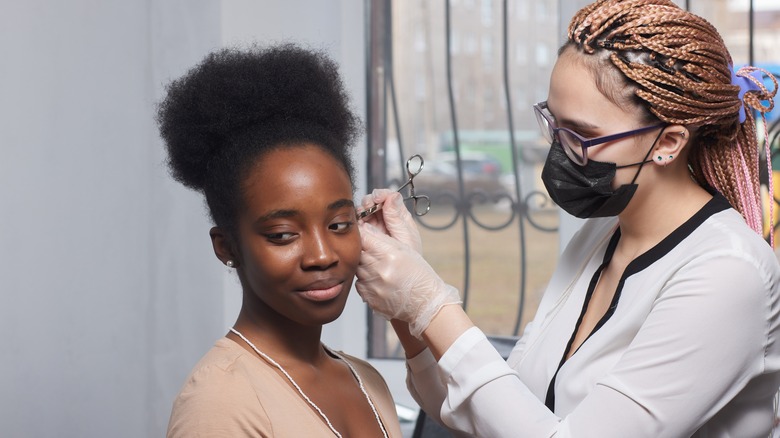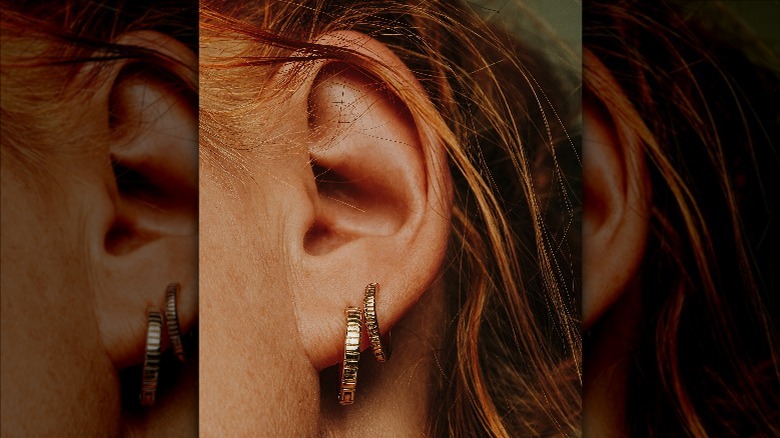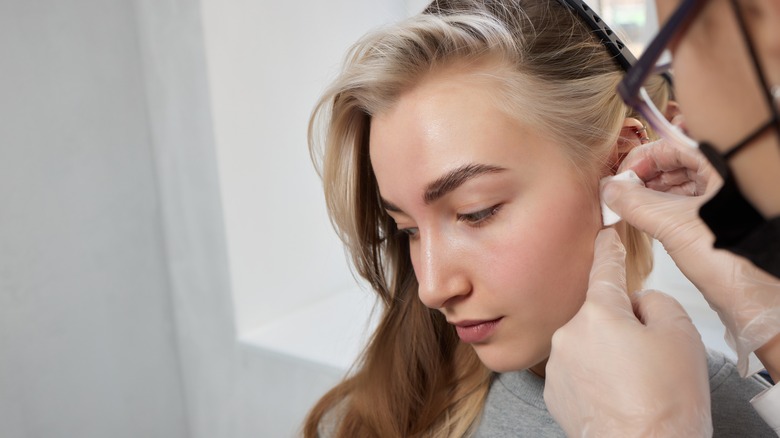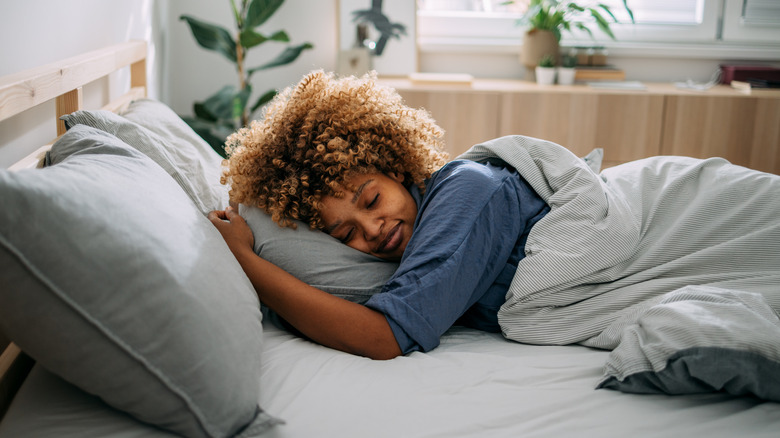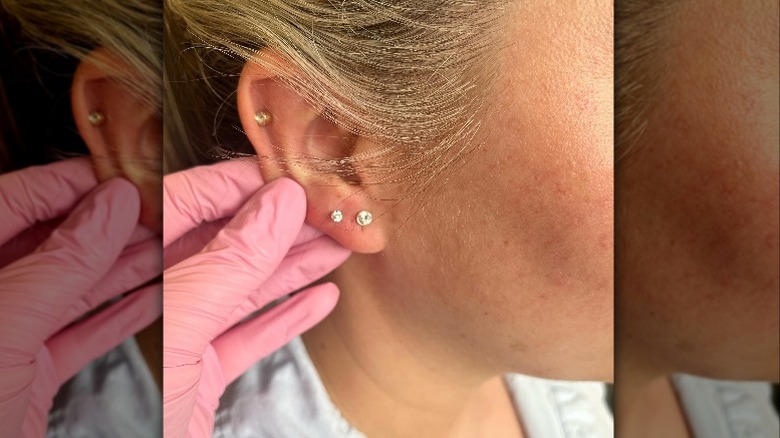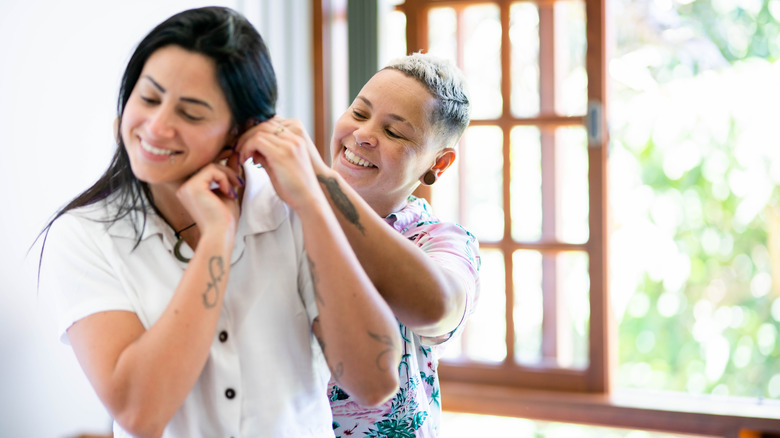We Have Answers To The Ear Piercing Questions You Probably Never Thought To Ask
The 2023 piercing trends have lots of us wanting to add many more jewelry pieces to our ears. If this sounds like you, then chances are you have a few questions about how you should prepare to go under the needle, so to speak. Luckily, you don't have to be left wondering when it comes to getting a new piercing. There are a few simple tips and tricks that you can have in your arsenal to make your experience a great one.
If you love the idea of getting a new piercing but are feeling a bit too nervous to take the plunge, fear not. Personal style is timeless, so there's no reason to fear commitment when it comes to piercings that we know fit who we are. Furthermore, making your piercing experience go seamlessly is a lot easier than you think. From how to prepare, to how may piercings to get at once, we've got all the answers to some very important questions that you probably haven't asked yet. But, we have a feeling that once you hear the answers, you'll be more ready than ever to add that new piercing to your collection.
How should I choose my piercing placement?
If you're planning on getting a new ear piercing, then chances are you already have a place in mind. Still, you should take a few logistical things into consideration before you pick your piercing placement. Simply touching the different parts of your ear will show you just how many different textures your ear contains. Consequently, these different parts will heal very differently when pierced. Squishy parts of your ear like your earlobe will have a quicker and easier healing process than others. This is one of the reasons why your earlobe is a great place to start in terms of piercings.
Piercing the harder, cartilage parts of your ear will take a bit more care and time when healing. Hannah Martin, owner and namesake of Hannah Martin Pierced, told British Vogue that the next best option after your ear lobe is your conch. This is the lower, inner part of your cartilage just above your earlobe. According to Martin, this is a less painful spot to have pierced than the outer, top parts of the ear, and its protected placement prevents it from getting bumped, irritated, or caught on things than the outer parts of your ear. As a result, it won't take quite as long to heal.
How many piercings can you get at once?
It's no surprise that lots of us are curious about just how many piercings we can get at one time. Ears that are packed with piercings are all the rage these days, and as a result, plenty of people consider expediting the process by getting a few piercings all at once. But, is this actually safe? The short answer is yes. You can get more than one piercing in one sitting, but you shouldn't get more than three. That said, planning out which piercings you'll be getting when can save you a lot of pain and difficulty.
When choosing whether or not you should get multiple piercings at once, consider how you like to sleep. If you sleep on your side, you should keep this in mind when getting multiple piercings. For cartilage piercings, rolling around or sleeping on your fresh piercings at night can cause irritation and difficulty with healing. Don't get too many piercings at once on the side you like to sleep on, or if you're comfortable sleeping on different sides, leave one ear without new piercings to ensure a comfortable way to rest your head. Ultimately, though, more often than not, it's best to spread out when you get each of your piercings to allow for an easier healing process.
How do I prep?
Most of us are likely more inclined to ask about what to do after getting our new piercing than how to prepare for it. Interestingly, though, preparing well for your piercing appointment can make your experience pleasant and set you up for success when it comes to healing. Give your body extra attention over the course of the days leading up to your appointment. Get plenty of sleep, and eat healthy, nutrient-dense meals to get your body prepared. You should also keep your drug and alcohol use at a minimum leading up to your appointment.
If you have prior experience with piercings, then you probably aren't too nervous about the process. Regardless of your nerves, though, keep in mind that if you've researched and carefully selected your piercer, then there's nothing to worry about. Try to keep your stress and worry in check, and remember that the pain of piercings is often much less bothersome than you may anticipate. One easy way to ward away worry about your piercing is to avoid doing too much internet research into what the process will be like and avoiding consulting with folks who may share stories of rare bad experiences with you.
In the two hours leading up to your appointment, drink lots of water, and have a meal packed with vitamins and nutrients. If you're feeling sick or overly stressed, consider postponing your piercing. Feeling your best leading up to the appointment will make things go smoothly.
What can I do while getting my piercing?
There are two things that you should avoid when it comes to your piercing appointment: Don't be drunk, and don't bring your friends. We know; we know — these are both fairly popular ways for folks to calm their nerves and feel more comfortable at their piercing appointment. Yet, both of these plans can backfire and cause more harm than good. Instead, if you do feel worried, you should calm your nerves naturally. Stay sober for your appointment, and opt to head there either by yourself or with one loved one who you know won't cause drama or extra nerves. Piercer to the stars, J. Colby Smith, told Teen Vogue, "People transmit nervous energy onto their friends, so sometimes it's better to be alone. He added, "It's easier for me to connect with my clients and keep their energy under control if they're on their own."
Otherwise, just make sure that you show up to your appointment in comfortable clothes and with a plan of what you want for your piercing and how you plan on caring for it once it's in. Keep in mind that if, for any reason, you feel uncomfortable when you arrive, you can always postpone until another time — don't feel pressured to stay in an uncomfortable situation.
How do I avoid issues after my piercing?
If you've gotten a piercing before, you know that aftercare is often the most important parts of the piercing process. While getting your piercing only takes a moment, healing properly is a longer process. Keeping your piercing clean is one of the most important aspects, but it's not as complicated as you may think. Clean your piercing with either soap and water or salt water. J. Colby Smith recommends doing this once in the morning and once at night, per Teen Vogue.
You may have heard that your piercing will get stuck if you don't twist it constantly, but this is actually a myth. Your piercing won't get stuck to your ear if you don't twist it, but you can twist it a bit if you're getting scabs. Otherwise, just make sure to keep it clean, always rinse thoroughly, and apply ice if you have swelling. You may also want to invest in a neck pillow so that you can sleep soundly without irritating your piercing. Lastly, while it's always important to check in with your doctor if you think your piercing is infected, make sure to give your body the time it needs to heal, and don't be alarmed if your skin becomes a bit irritated; it is a new piercing, after all! Good piercings take time.
